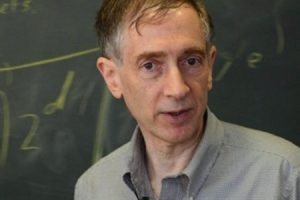 The Second Annual Kliakhandler Lectures will be held Sept. 29-30 at Michigan Tech. Richard Stanley of MIT will deliver the lectures which are sponsored by the Mathematical Sciences and funded by a generous gift from former faculty member Igor Kliakhandler.
The Second Annual Kliakhandler Lectures will be held Sept. 29-30 at Michigan Tech. Richard Stanley of MIT will deliver the lectures which are sponsored by the Mathematical Sciences and funded by a generous gift from former faculty member Igor Kliakhandler.
The Kliakhandler lecture series brings a top mathematician to campus each year to give a pair of lectures.Stanley is a prolific mathematician who has won numerous honors, is a member of the National Academy of Sciences and a Fellow of the American Mathematical Society and the American Academy of Arts and Sciences. He has won the Society of Industrial and Applied Mathematics’ George Pólya Prize in Applied Combinatorics, the Leroy P. Steele Prize for Mathematical Exposition from the American Mathematical Society and the Rolf Schock Prize for Mathematics.
His first lecture is from 5 to 6 p.m. Thursday, Sept. 29 in Dow 641. Stanley’s lecture will be “Plane Tilings,” in which he will discuss the challenges of filling a planar region with a given collection of shapes (tiles). A jigsaw puzzle is a familiar type of tiling, though it is not very mathematical; decorative tile floors often use plane tiling to create an aesthetic effect. The physicist Roger Penrose created a family of tilings that are known as Penrose tilings.
Stanley will survey some interesting mathematics associated with plane tilings and discuss questions such as the following: Is there a tiling? If so, how many are there? If no tiling exists, how can we prove this? What special properties, such as symmetry, can a tiling possess? These questions involve such subjects as combinatorics, group theory, probability theory, number theory and computer science.
From 1 to 2 p.m. Friday, Sept. 30 in Fisher 138, Stanley will deliver a colloquium entitled “A Survey of Alternating Permutations.” Permutations are fundamental transformations in mathematics, and alternating permutations comprise one of the most important families of permutations. Stanley will discuss several aspects of the theory of alternating permutations and describe applications to topics such as group theory and geometry.
